
The experiential learning concept
We Introduced experiential learning to develop personality, expand the horizon, inculcate original thinking, and develop observation and writing skills
Experiential Learning is learning from experience. Children learn about mountain springs, cloud watching, star watching, mountain shapes and terminology, terraced cultivation, semaphore silent signals, and more. This new way of “learning by doing” is a wonderful tool for learning all subjects, and is also so much fun.

Our experiential syllabus covers a wide range of experiences, which enables the widening of horizons for the children, builds self- confidence, inquisitiveness, pride, improves vocabulary, composition skills, speech, clear thinking, and writing ability. The syllabus includes the following: -
- Nature awareness: Flora, farm animals, insects, birds, nature (such as sun, wind, shade, shadows, clouds, rain and so on), and agriculture in different seasons, identification of common trees and plants, (find the tree from the leaf), flowers in nature, mountain shapes, terrace farming, mountain springs, and gardening.
- Physical development and outdoor skills; Free standing exercises, power walking, coordination games with balls, Frisbee and rings, Confidence course, Camp craft, Nature walks, inquisitive hiking, skill with Knots and lashes, silent field signals, Semaphore signalling, use of prismatic compass and stars for finding direction, and cloud watching.
- Crafts: Children enjoy making a mud oven, baking cakes, pizza, etc. Tie and dye techniques, Bamboo basket, and straw mat making are some of the crafts that have been introduced.
- Social: We aim to build pride in the heritage, respect for elders, and social awareness through live interaction with family, farm and homesteads. These have been an ongoing part of our nature walks, inquisitive hiking, and field projects such as paddy sowing.
- Original thinking and writing: Experiences are followed by discussion and writing about the experience. This enhances observation and recording skills, whilst improving English vocabulary and writing skills.
Physical Development included in syllabus as assessed subject
As part of experiential learning, a comprehensive physical development program has been evolved. The idea is to help children develop healthy habits by guiding them to participate in structured physical activity which comprises , free standing exercises, jogging, power walking, skipping, throw & catch exercises with Frisbee &, tourniquet, ball games, and competitions.
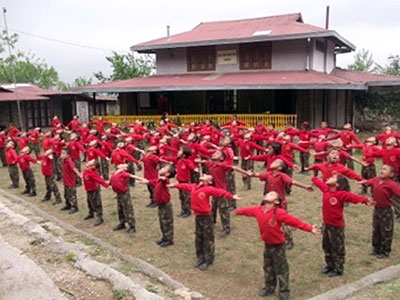
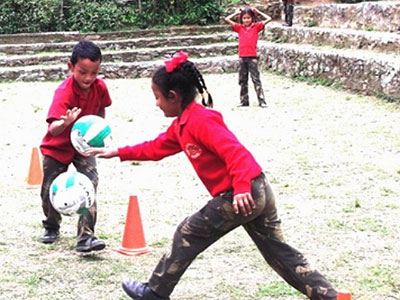
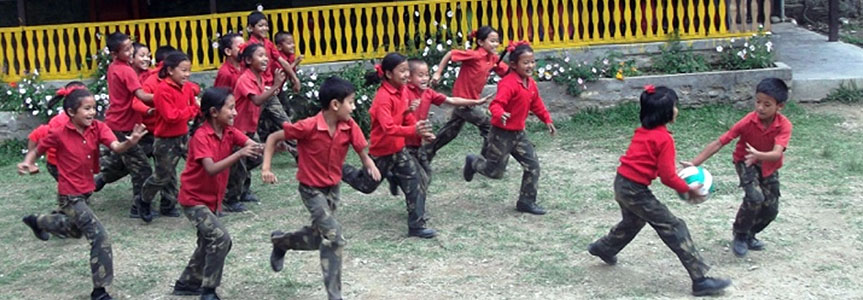
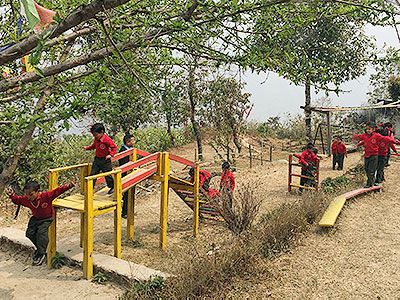
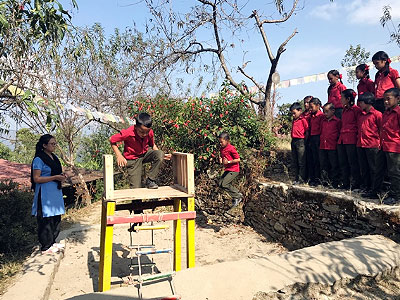
Confidence course
comprises a set of fun- obstacles. The course aims to build self-confidence and determination to succeed. Further it helps to enhance physical ability by developing agility, balance, strength, and coordination; whilst removing fear of heights and darkness. Children are also introduced to the concept of obedience, discipline, team work, leadership, and follower- ship. At the same time the children learn the meaning of commands in English, counting numbers, distinguishing colours, sizes and shapes. All this is done in a relaxed atmosphere, free of tension, to make it a fun activity. Three levels of confidence courses; one each for nursery, KG, and primary have been evolved. These have proved their effectiveness as a multi-activity tool to enhance physical ability, personality development, spoken English, and sensory skills.
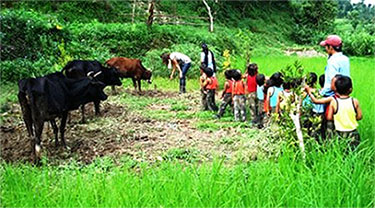
The Nature Walk
The Nature walk was designed as a multi-activity awareness and learning tool, to optimize the use of our rural setting for expanding the knowledge base, through nature experiences, and to develop the personality. This has proven to be popular with children, and useful in enhancing learning in a host of subjects. It enhances nature awareness, builds pride in the children’s rural roots, instils respect for elders, and teaches how to differentiate between sizes (Big & Small) colours, shapes, distances, terrain and numbers. Children are also introduced to Flora, farm animals, insects, birds, nature (such as sun, wind, shade, shadows, clouds, rain and so on), and agriculture in different seasons. The children also visit homesteads and meet “live” families, learning English words for calling and greeting each member, learn to respect elders and practice using English words, for familiar objects in the homestead. The walks builds nature awareness, reinforces class room knowledge, and introduces many new English words in the vocabulary.
Inquisitive hiking, and camping,
Expanding on the scope of the nature walk, we have developed our concept of learning through all senses and experiences; by designing Inquisitive hiking, with a view to enable children to learn whilst enjoying walking in nature
Hikes are designed to enhance physical fitness, develop curiosity about Nature, create an interest in recording explorations by drawing, taking notes and photography
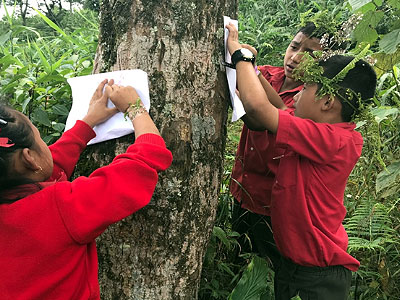
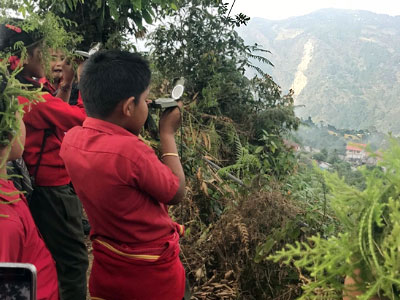
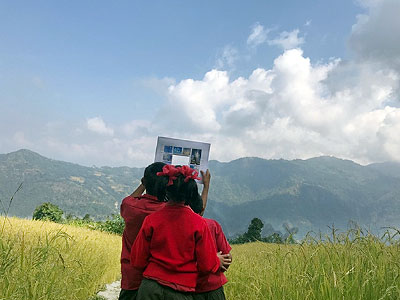
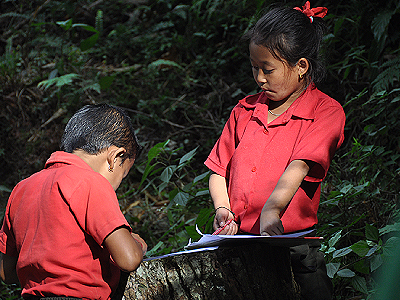
We aim to build pride and happiness in the children’s rural heritage, by visiting farming families, and get to know them. Whilst hiking we continue to build English vocabulary



A typical day hike takes the children to remote farming hamlets. Divided into groups and lead by a “leader”, the children walk to designated family homestead, and are required to enquire and answer a set of questions. The children are expected to find out the information, by observation and asking questions. They then record the information and draw a sketch of the homestead. Walking through forests, grasslands, terraced cultivation, orange and papaya plantations, and crossing mountain streams, the learning exercise continues. Some of the things the children experience and learn, are route marking, use of silent signals, finding out the names of trees, and flowers, thatch grass and its uses, bark tracing, and visit to a logging camp to learn about the effect of deforestation on the environment, and the value of planting trees. Overnight camping is the final experience . Children set up camp and cook a one pot meal. They get a taste of star watching and direction finding by compass, and making improvised shelters. Back at school, the children, refine their field drawings, and make a book containing text, drawing, and photos, about the hiking experience. Also, they revise new words that were added to their vocabulary
